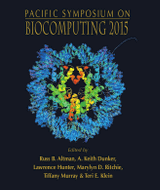
H. Billur Engin1, Matan Hofree2, Hannah Carter1
1School of Medicine, University of California San Diego
2Department of Computer Science and Engineering, University of California San Diego
Email: hengin@ucsd.edu, mhofree@ucsd.edu, hkcarter@ucsd.edu
Pacific Symposium on Biocomputing 20:84-95(2015)
Here we present a method for extracting candidate cancer pathways from tumor ‘omics data while explicitly accounting for diverse consequences of mutations for protein interactions. Disease-causing mutations are frequently observed at either core or interface residues mediating protein interactions. Mutations at core residues frequently destabilize protein structure while mutations at interface residues can specifically affect the binding energies of protein-protein interactions. As a result, mutations in a protein may result in distinct interaction profiles and thus have different phenotypic consequences. We describe a protein structure-guided pipeline for extracting interacting protein sets specific to a particular mutation. Of 59 cancer genes with 3D co-complexed structures in the Protein Data Bank, 43 showed evidence of mutations with different functional consequences. Literature survey reciprocated functional predictions specific to distinct mutations on APC, ATRX, BRCA1, CBL and HRAS. Our analysis suggests that accounting for mutation-specific perturbations to cancer pathways will be essential for personalized cancer therapy.